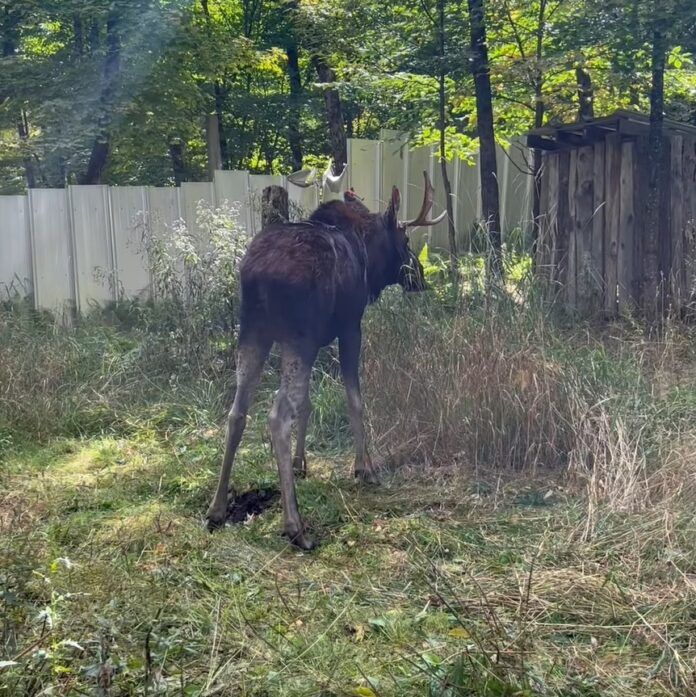The moose that was seen making its way through Huntsville over the past week is being taken care of by Aspen Valley Wildlife Sanctuary, but its Director of Animal Welfare says it’s frustrating to see how it was treated before being captured.
“We started getting calls about him last Thursday that he was making his way around town,” says Jan Kingshott but adds they aren’t sure where the male moose came from. On Saturday, she explains the National Wildlife Centre and the Ministry of Natural Resources and Forestry stepped in and were able to sedate the moose. Kingshott says it was then brought to them to be cared for.
“It’s a little bit frustrating,” says Kingshott about how close people got to the moose. “I think what’s happening is we’re losing our respect for wildlife just to get a selfie. It’s an attitude we need to change.”
She adds that it’s becoming an issue around the world, not just in Muskoka. “These animals can be extremely dangerous so you’re putting your safety at risk, but you’re also putting the animal’s safety at risk,” she continues.
“We’re surrounded by so much forest so I think when [the animals] are dispersing, looking for food, or looking for a place to breed, they’re moving around a lot more and that’s how they end up in these situations,” explains Kingshott. However, more often than not, when the animals realize where they are, they turn around and head back into the forest. “In this case, we’re not really sure why he stayed in town,” she says. “His behaviour was certainly unnatural. We don’t see moose typically wanting or looking for human attention.”
Kingshott says there are two possibilities for why the moose stuck around: he’s habituated and used to being around people or, which is what sanctuary staff believe, the moose is in the first stages of brain worm.
“It’s basically a parasite and the white-tailed deer is the host,” she explains. “If an animal like the moose picks up the parasite, it migrates and goes into the brain and it affects the nervous system and then we start seeing symptoms in the moose like weakness, fearlessness – which we are with this moose – and lack of coordination.”
It’s possible, Kingshott continues, that the moose is just friendly and if that’s the case he will be released once moose hunting season ends in late November.
“We’re optimistic that he’s going to be heading back out,” she says.
This moose makes it seven that the sanctuary is now caring for. “It’s unheard of,” says Kingshott. Along with the male moose, there’s a two-year-old female moose from Sudbury that was brought in this past spring under similar circumstances. There are also the five orphaned moose that were brought to the sanctuary in June.



